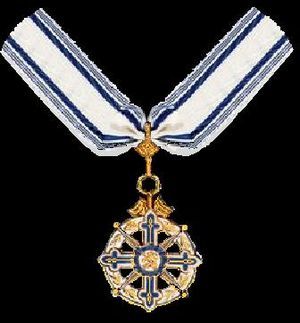Bavarian Maximilian Order for Science and Art
| Bavarian Maximilian Order for Science and Art | |
|---|---|
 | |
| Awarded by the Minister-President of Bavaria | |
| Type | Order of Merit |
| Established | 28 November 1853 18 March 1980 (re-established) |
| Country | Bavaria, Germany |
| Eligibility | Preferably German scientists and artists |
| Awarded for | Outstanding achievements in the field of science and art |
| Status | Currently awarded |
| Founder | Maximilian II |
| Statistics | |
| First induction | 1853 |
| Total inductees | 573 (as of 2018)[1][2] |
| Precedence | |
| Next (higher) | none (highest) |
| Next (lower) | Bavarian Order of Merit |
Ribbon bar of the order | |
The Bavarian Maximilian Order for Science and Art (German: Bayerischer Maximiliansorden für Wissenschaft und Kunst) was first established on 28 November 1853 by King Maximilian II von Bayern. It is awarded to acknowledge and reward excellent and outstanding achievements in the field of science and art. From 1933 onwards (with the beginning of the Nazi regime) the order was no longer awarded, until 1980 when it was reinstated by the then Minister-President of the Free State of Bavaria Franz Josef Strauß.[3] Munich jewellers Hemmerle have been responsible for making the medal since 1905. [4]
Preamble
[edit]In continuation of a Bavarian tradition, the Bavarian Maximilian Order for Science and Art was created. It is awarded to reward outstanding achievements in the field of science and art. (In Fortsetzung alter bayerischer Tradition wird der Bayerische Maximiliansorden für Wissenschaft und Kunst geschaffen. Mit ihm sollen herausragende Leistungen auf dem Gebieten von Wissenschaft und Kunst ausgezeichnet werden.)[3]
Criteria
[edit]The Maximilian Order is preferably awarded to German scientists and artists. It is not restricted to citizens of Bavaria. The order was instituted in one class and two sections (science and art). The order is restricted to 100 living members.[5]
Nomination procedure
[edit]The Minister-President, the minister of state for their respective portfolio, and the two sections of the order are eligible to nominate new members. These proposals are evaluated by an advisory committee (Ordensbeirat). It gives its recommendation to the Minister-President for the final decision.[6]
The advisory committee consists of:
- the President of the Landtag of Bavaria,
- the member of the government who is deputy of the Minister-President,
- the State Minister of Sciences, Research and the Arts,
- the President of the Bavarian Academy of Sciences and Humanities,
- the President of the Bavarian Academy of Fine Arts,
- the President of one of the Bavarian Art Colleges (Kunsthochschulen),
- the President of one of the Bavarian Universities and
- a representative of the applied sciences, who is named by the Minister-President.
All members of the advisory committee are selected for a period of five years. The committee decides with the majority of its members.[6]
Members
[edit]From 1980 to 2018 the order has been awarded to 222 recipients.[2] The number of living members of the order cannot exceed 100.[2] As of December 2018 there are 95 living members of the order.[2]
From 1853 to 1932 the order has been issued 351 times.[1]
References
[edit]Citation
[edit]- ^ a b Körner 1984, p. 350.
- ^ a b c d "Terminhinweis: Ministerpräsident Dr. Markus Söder verleiht Bayerischen Maximiliansorden" (Press release) (in German). Munich: Bayerische Staatsregierung. 11 December 2018. Archived from the original on 26 October 2019. Retrieved 11 December 2018.
- ^ a b Gesetz über den Bayerischen Maximiliansorden für Wissenschaft und Kunst vom 18. März 1980, Artikel 1 (German)
- ^ Royce-Greensill, Sarah (9 March 2018). "Hemmerle celebrates 125 years with a collection inspired by its past as a medal-maker". The Telegraph. Telegraph. Retrieved 18 April 2018.
- ^ Gesetz über den Bayerischen Maximiliansorden für Wissenschaft und Kunst vom 18. März 1980, Artikel 2 und 3 (German)
- ^ a b Gesetz über den Bayerischen Maximiliansorden für Wissenschaft und Kunst vom 18. März 1980, Artikel 6 (German)
Sources
[edit]- Schreiber, Georg (1964). Die Bayerischen Orden und Ehrenzeichen (in German). Munich: Prestel-Verlag.
- Körner, Hans (1984). "Der Bayerische Maximiliansorden für Wissenschaft und Kunst und seine Mitglieder". Zeitschrift für Bayerische Landesgeschichte (in German). 47: 299–398. Archived from the original on 19 July 2018. Retrieved 24 July 2012.; as book: Hefte zur Bayerischen Landesgeschichte (in German). Vol. 2. Kommission für bayerische Landesgeschichte bei der Akademie der Wissenschaften. 2001. ISBN 3-7696-9700-6.
- "Gesetz über den Bayerischen Maximiliansorden für Wissenschaft und Kunst" (PDF). Bayerische Staatsregierung (in German). München. 18 March 1980. Archived from the original (PDF) on 27 September 2011. Retrieved 25 February 2018. (The law)
External links
[edit]- Arts awards in Germany
- German science and technology awards
- Orders, decorations, and medals of Bavaria
- Orders, decorations, and medals of the states of Germany
- History of Bavaria
- Kingdom of Bavaria
- Awards established in 1853
- Awards disestablished in the 1930s
- Awards established in 1980
- 1853 establishments in Bavaria
- 1933 disestablishments in Germany
- 1980 establishments in West Germany

